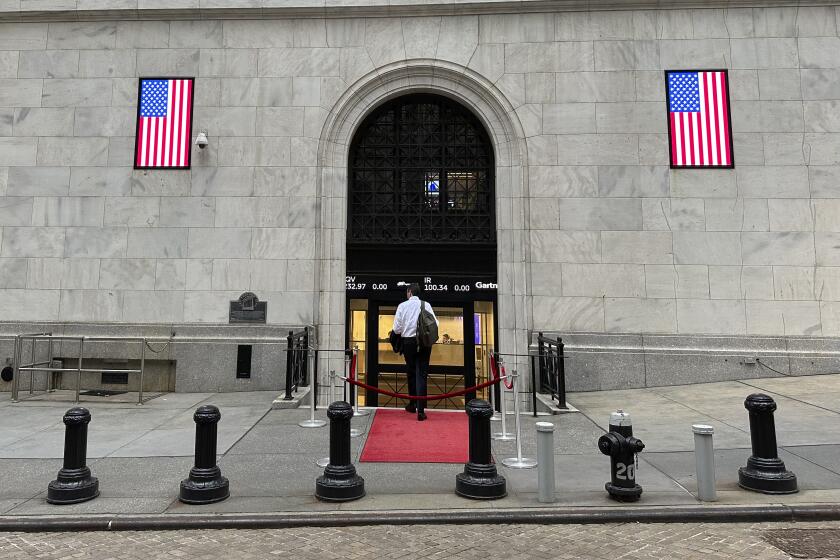Insurers forcing patients to pay more for costly specialty drugs
Thousands of patients in California and across the nation who take expensive prescription drugs every month for cancer, rheumatoid arthritis and other ailments are facing sticker shock at the pharmacy.
Until recently, most of these patients typically paid modest co-pays for the advanced drugs. But increasingly, Anthem Blue Cross, Aetna and other insurers are shifting more prescriptions to a new category requiring patients to shoulder a larger share of the drug’s cost.
The result: Pharmacy bills are going up by hundreds of dollars a month — on top of insurance premiums.
Robert Gomer, who owns an interior plant business in Rancho Mirage, saw his cost for three HIV drugs soar to $450 a month on a new Anthem Blue Cross plan this year from $80 a month on a previous plan.
“All of a sudden you’re starting to count pills and asking friends to borrow some,” Gomer said. “It was a very stressful situation to be faced with.”
Anthem, the state’s largest for-profit insurer and a unit of WellPoint Inc., adjusted its prescription drug coverage early this year. It said it shifted more medications to the most expensive tier for many of its employer plans to keep premiums more affordable.
“Because high-cost pharmaceuticals reduce the affordability of health insurance, Anthem moved some of these drugs from a co-pay tier to a cost-sharing tier,” said company spokesman Darrel Ng. “We continue to evaluate and refine the drug classifications in our four-tier plans to enhance value and affordability.”
Robert Galle, Aetna’s head of pharmacy benefit management operations, said his company is responding to employers’ concerns about escalating costs from these specialty drugs. “As new drugs are brought to the market, we are generally adding them to these tiers,” he said.
Consumer advocates and some benefit consultants argue this trend could backfire as a cost-saving tool if workers stop taking needed medications and require even more costly medical care down the road.
Proposed state legislation would cap out-of-pocket expenses for prescriptions and other medical costs, but the insurance industry is fighting that move. Insurers say those caps will drive up premiums for all customers and that state rules are unnecessary because the federal Affordable Care Act establishes out-of-pocket spending limits in 2014. Insurers also note that caps don’t address the underlying increase in drug prices.
Nationwide, an estimated 57 million Americans rely on specialty drugs for complex conditions. These medications account for only 1% of total drug use, but 17% of drug spending by insurers because of the high prices, according to IMS Health, which tracks medical data.
What’s more, the struggle over drug spending is projected to intensify as the number of biological drugs and the conditions they can treat is expected to soar in the years ahead. Healthcare researchers say they could account for 40% of overall drug spending by 2020.
In most cases, cheaper generic substitutes don’t exist for these drugs because many are derived from living organisms, not chemical compounds that can easily be copied.
The average annual cost for multiple sclerosis drugs was $24,116 in 2010, according to Express Scripts, a pharmacy benefit manager. The average for pulmonary hypertension was $32,570. Employers and insurers are picking up most of that tab now.
To help lower their costs, health plans are changing their approach to drug coverage, often expanding from a three-tier to a four-tier plan. The first tier would be generic drugs at a $10 co-payment, for instance, the second tier preferred brand-name drugs at a $30 co-pay, the next tier non-preferred brand-name drugs for $50, and the top tier would be dozens of specialty drugs costing patients 10% to 30% co-insurance or $150 co-pays.
Nationwide, 14% of workers are in a plan with four or more tiers of cost sharing for prescription drugs, compared with 7% five years ago, according to the Kaiser Family Foundation.
Melanie Rowen, a 34-year-old career counselor in Berkeley, racked up thousands of dollars of credit card debt to pay for her multiple sclerosis drug. She was responsible for 30% of the price of a medication called Rebif, which initially cost her $680 a month and jumped to nearly $900 a month in a year’s time — until she recently switched jobs.
“It blew my mind,” Rowen said. “I felt like I was staring into the financial abyss.”
Assemblywoman Fiona Ma, a San Francisco Democrat, is pushing a bill that seeks to limit consumers’ financial exposure to high drug costs and other medical bills. The proposed legislation would cap annual out-of-pocket medical costs at $5,950 for an individual and $11,900 for a family.
Lawmakers in more than 20 states have introduced similar measures to limit bills for expensive medications. In 2010, New York banned four-tier and higher pharmacy plans.
The California Assn. of Health Plans is fighting the proposed legislation on the grounds that it curtails ways to keep premiums affordable and the federal healthcare law addresses the issue. “Capping out-of-pocket costs doesn’t make healthcare less expensive. It just shifts costs into premiums,” said Charles Bacchi, executive vice president of the industry group.
But supporters say the uncertainty of whether the federal healthcare law will survive a constitutional challenge gives even more reason to enact these consumer protections at the state level.
“It doesn’t take a lot to push a whole range of families into medical debt and bankruptcy,” said Anthony Wright, executive director of Health Access, a consumer advocacy group.
Carrie Thorpe, a 52-year-old event planner in Temecula, pays $150 each month for an injectable drug to treat her multiple sclerosis that costs $4,000 per month overall. She said she couldn’t afford her share without help from a patient assistance program.
“I can’t function without this medication,” she said. “I’m at the mercy of whatever the cost is.”
More to Read
Inside the business of entertainment
The Wide Shot brings you news, analysis and insights on everything from streaming wars to production — and what it all means for the future.
You may occasionally receive promotional content from the Los Angeles Times.







